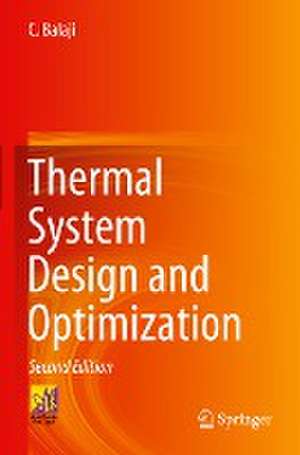Thermal System Design and Optimization
Autor C. Balajien Limba Engleză Paperback – 30 ian 2022
| Toate formatele și edițiile | Preț | Express |
|---|---|---|
| Paperback (1) | 493.51 lei 6-8 săpt. | |
| Springer International Publishing – 30 ian 2022 | 493.51 lei 6-8 săpt. | |
| Hardback (1) | 595.21 lei 6-8 săpt. | |
| Springer International Publishing – 30 ian 2021 | 595.21 lei 6-8 săpt. |
Preț: 493.51 lei
Nou
Puncte Express: 740
Preț estimativ în valută:
94.45€ • 98.24$ • 77.97£
94.45€ • 98.24$ • 77.97£
Carte tipărită la comandă
Livrare economică 14-28 aprilie
Preluare comenzi: 021 569.72.76
Specificații
ISBN-13: 9783030590482
ISBN-10: 3030590488
Pagini: 377
Ilustrații: XVII, 377 p. 155 illus., 2 illus. in color.
Dimensiuni: 155 x 235 mm
Greutate: 0.55 kg
Ediția:2nd ed. 2021
Editura: Springer International Publishing
Colecția Springer
Locul publicării:Cham, Switzerland
ISBN-10: 3030590488
Pagini: 377
Ilustrații: XVII, 377 p. 155 illus., 2 illus. in color.
Dimensiuni: 155 x 235 mm
Greutate: 0.55 kg
Ediția:2nd ed. 2021
Editura: Springer International Publishing
Colecția Springer
Locul publicării:Cham, Switzerland
Cuprins
Introduction to Design and System Design.- System Simulation.- Curve Fitting.- Optimization-Basic Ideas and Formulation.- Lagrange Multipliers.- Search Methods.- Linear Programming and Dynamic Programming.- Non-traditional Optimization Techniques.- Inverse Problems.
Notă biografică
Dr. C. Balaji is currently a Professor in the Department of Mechanical Engineering at Indian Institute of Technology Madras. He graduated in Mechanical Engineering from Guindy Engineering College, Chennai, in 1990 and obtained his M.Tech (1992) and Ph.D. (1995) both from IIT Madras in the area of Heat Transfer. He taught briefly at the National Institute of Technology, Trichy and was a Scientist at the National Institute of Ocean Technology, Chennai before joining IIT Madras in 1998 as a faculty member. His areas of interest include heat transfer, optimization, inverse problems, satellite meteorology and atmospheric Sciences. He has more than 190 international journal publications to his credit and has guided 29 Ph.D. students so far. He has undertaken several projects for the industry. Prof. Balaji has several awards to his credit and notable among them are the Young Faculty Recognition Award of IIT Madras (2007) for excellence in teaching and research, the K.N. Seetharamu Award and Medal for excellence in Heat Transfer Research (2008), Swarnajayanthi Fellowship Award of the Govt. of India (2008-2013), the Marti Gurunath Award for excellence in teaching (2013) and the Mid Career Research Award (2015). He is a Humboldt Fellow and an elected Fellow of the Indian National Academy of Engineering.
Textul de pe ultima copertă
This highly informative and carefully presented textbook introduces the general principles involved in system design and optimization as applicable to thermal systems, followed by the methods to accomplish them. It introduces contemporary techniques like Genetic Algorithms, Simulated Annealing, and Bayesian Inference in the context of optimization of thermal systems. There is a separate chapter devoted to inverse problems in thermal systems. It also contains sections on Integer Programming and Multi-Objective optimization. The linear programming chapter is fortified by a detailed presentation of the Simplex method. A major highlight of the textbook is the inclusion of workable MATLAB codes for examples of key algorithms discussed in the book. Examples in each chapter clarify the concepts and methods presented and end-of-chapter problems supplement the material presented and enhance the learning process.
Caracteristici
Equips readers by following an example-driven approach Enriches understanding of classical and modern techniques of optimization Simplifies a complicated picture by using a conversational style of writing
